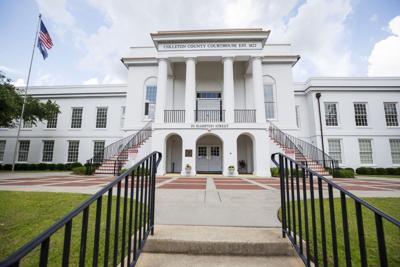WALTERBORO — More than a month after two members of a prominent South Carolina family were found dead, police say it’s still too early in the investigation to say what evidence will end up being important.
That is the State Law Enforcement Division’s argument for continuing to keep secret even basic details of what investigators have found so far about the June 7 shooting deaths of Maggie and Paul Murdaugh at their family’s hunting lodge on the edge of Colleton County.
Circuit Judge Bentley Price asked SLED and the Colleton County Sheriff’s Office to justify the extensive redactions they applied to their public reports on the killings, which were only released after The Post and Courier filed a lawsuit. At a July 14 hearing on the blacked-out information, Edward Fenno, an attorney for the newspaper, argued that the agencies had been "unlawfully heavy-handed" in their approach.
"They're not thinking about the Freedom of Information Act," Fenno said. "They're just redacting as they see fit."
South Carolina’s open-records law allows police to withhold information if releasing it would interfere with potential law enforcement action, give up their techniques or invade someone’s privacy.
In justifying their redactions, the agencies acknowledged that they blacked out all manner of details, including who found the bodies and where they were found, what vehicles and firearms were nearby, and which neighboring properties had security cameras.
The agencies argue that such details should stay private in part so that investigators can test potential witnesses’ truthfulness. They also contend that details about the crime would likely “be misconstrued by the general public.”
SLED's general counsel, Adam Whitsett, said at the hearing that the state Legislature intended to give police wide latitude in releasing information. Lawmakers in 2017 expanded exemptions for law enforcement.
"They did so to protect the integrity of the criminal justice process," Whitsett said.
And in a sign of where the investigation stands after a month, they argue that they don’t know what details will be relevant to solving the crime.
“At this stage of any investigation such as this, it is exceedingly difficult to know precisely what evidence, witnesses, and information are of ultimate importance, and what evidence, witnesses, or information proves to be of little value,” SLED and the Sheriff’s Office wrote in their explanation.
In a brief to the court, Fenno countered that the law doesn’t let police withhold information based on hypothetical concerns. Police have to prove that disclosing information “ 'would' interfere” with their work or “ 'would' cause similar problems,” he wrote.
“The FOIA statute does not say ‘might’; it says ‘would,’ ” Fenno wrote.
At the July 14 hearing, Price said he would review the redactions and order the agencies to release more information if he concluded they had overstepped.
The agencies had previously resisted releasing even the heavily redacted version of their reports. SLED made them public only days after The Post and Courier sued the agencies for allegedly violating the state’s Freedom of Information Act.
Under state law, police reports are public records, and members of the public don’t need to submit a written request to read them within 14 days of an incident. Yet in the days after the Murdaugh killings, SLED and the Sheriff’s Office turned the newspaper’s reporters away. Before The Post and Courier filed its lawsuit on June 17, the agencies released only a one-line report that said police were called to an address.
Why authorities redacted Murdaugh case information
The State Law Enforcement Division and the Colleton County Sheriff’s Office released heavily redacted reports from the Murdaugh double-homicide case after The Post and Courier filed a lawsuit against the two agencies.
Below is an annotated copy of the reports showing the information that has been withheld from the public and the explanations the agencies offered for doing so.
Police have made no arrests in the case, and they have named no suspects or possible motives for why 22-year-old Paul and 52-year-old Maggie Murdaugh might have been shot. Police immediately assured the public that there was no danger, without explaining how that conclusion was reached.
Later, the Murdaugh family offered a $100,000 reward for information that secures a conviction, and SLED set up a tip line to solicit information from the public, signaling that the search is wide open.
In the void of information, rumors and speculation have swirled, amplified by international media interest in the case and the Murdaugh family’s prominent position in the state’s southernmost region.
The family founded a law firm in the small town of Hampton a century ago and established rural Hampton County as a hostile environment for big companies. The firm, Peters, Murdaugh, Parker, Eltzroth and Detrick, boasts multiple multimillion-dollar victories won in the county, which has fewer than 20,000 residents. Maggie and Paul Murdaugh were found on a sprawling tract of family land that straddles Hampton and Colleton counties.
The family also oversaw every criminal case in a five-county region for the better part of a century. Three generations of Murdaughs held office as the area’s top prosecutor for more than eight decades. The family still has ties to the office: Alex Murdaugh — Maggie’s husband and Paul’s father, who first reported the killings to police — works part time for the office.
That connection is how SLED came to run the investigation in the first place. The Colleton County Sheriff’s Office said it could not take the lead because it had a conflict of interest.










